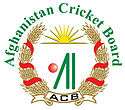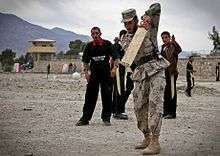Afghanistan Cricket Board
 | |
| Sport | Cricket |
|---|---|
| Abbreviation | ACB |
| Founded | 1995 |
| Regional affiliation | Asia |
| Affiliation date | 2001 |
| Location | Kabul, Afghanistan |
| President | Omar Zakhilwal |
| Chairman | Parwiz Khan |
| Chief Exec | Shafiq Stanikzai |
| Secretary | Taj Malik |
| Men's coach |
|
| Women's coach |
|
| Official website | |
|
[ cricket | |
Afghanistan Cricket Board (formerly Afghanistan Cricket Federation) is the official governing body of the sport of cricket in Afghanistan. Its current headquarters is in Kabul, Afghanistan.
The Afghanistan Cricket Board is Afghanistan's representative at the International Cricket Council and is an associate member of ICC since June 2013. Before that it was an affiliate member and has been a member of that body since 2001. It is also a member of the Asian Cricket Council.
Afghan President Hamid Karzai is the patron-in-chief of the board.
On 11 November 2010 the Afghan national women's cricket team was formed. This was to help females understand the game of cricket and have a parallel team to that of the men. Also policy states that as per Islamic tradition women can wear a headscarf or hijab which is their own choice.[1]
In July 2016, ACB unveiled a strategic plan and set targets for Afghanistan to be a top-six ODI team by 2019 and a top-three team in both T20Is and ODIs by 2025.[2] In Order to achieve this, ACB created a proposal to be presented to BCCI, in the works to secure annual bilateral matches against India and teams touring India beginning next year.[3] Shafiq Stanikzai, Chief Executive of ACB, said the draft had been presented to BCCI president Anurag Thakur in May and further discussions had happened during the ICC Annual Conference in Edinburgh in June, 2016.
History
Cricket was first played in Afghanistan during the 19th century Anglo-Afghan Wars, with British troops reported has having played in Kabul in 1839. However, unlike many countries, no lasting cricket legacy was left by the British, and it would be more than a hundred years before cricket returned.[4]
In the 1990s, cricket became popular amongst Afghan refugees in Pakistan, and the Afghanistan Cricket Federation was formed there in 1995. They continued to play cricket on their return to their home country in late 2001.[4] Like all sports, cricket was originally banned by the Taliban, but it became an exception in 2000 and the Afghanistan Cricket Federation was elected as an affiliate member of the ICC the following year.[5]
The Afghanistan national cricket team's 21-run win over Namibia in Krugersdorp earned them official One Day International status in April 2009. The team qualified for the 2012 ICC Under-19 Cricket World Cup.
Domestic competitions
Afghanistan's domestic structure consists of a 25-over Inter-Provincial Tournament, which has the participation of 22 provinces in the tournament. The aim of the tournament is to spread the game across the country and to generate a greater depth of talent for the national team to select from. A further aim of the tournament has been to remove the perception that the game was played almost exclusively by members of the Pashto tribe in the East of the country. The best players from the tournament would be selected players for Afghanistan-A and under-19 teams based on their performance and would be sent for training and coaching to Bangladesh. Afghanistan teams often visit Pakistan. Currently Afghanistan A team is visiting Pakistan.
Two teams from the 12-team first round will advance to the next round. The top six from the tournament will then contest Afghanistan's main domestic event - a 50 over tournament in Kabul in May 2010. The 50 over tournament was won by Kabul Province.
Starting in 2011, Afghanistan's domestic cricket structure has grown. The expanded Inter-Provincial Tournament was reorganized into a 50 over tournament and divided into a Challenge Cup section (the Etisalat ODN Challenge Cup[6] with 20 provincial teams) and an Elite Cup section (with 12 provincial teams; 4 of them qualifiers from the Challenge Cup section).[7] In addition to the Inter-Provincial cricket the Afghanistan Cricket Board (ACB) has divided the provinces of Afghanistan in to 5 Cricket Regions to enable the better management of the game. The Regions are Amo in the north (centered on Kunduz), Spin Ghar in the northeast bordering Pakistan (centered on Nangarhar), Band-e-Amir in the centre (centered on Kabul), Mes Aynak in the southeast (centered on Khost) and Boost in the west and southwest (centered on Kandahar).[8] The 5 regions in turn have representative teams which play in all traditional 3 formats of cricket; the Ahmad Shah Abdali One-Day Tournament, Ahmad Shah Abdali T20 Tournament[9] and Ahmad Shah Abdali Three-Day Tournament.[10]
In addition to an expansion of the inter-provincial tournament from 25-over matches to 50-over matches and the addition of the T-20 and multi-day formats, cricket in Afghanistan has now expanded across the provinces as well; 32 of the 34 provinces now have representatives sides[11] All provinces except Daykundi and Farah have a representative team, while the ACB recognizes Afghan Refugees[12] and Kochain[13] as provincial teams. There are also plans to expand the three-day league competition into a four-day league in 2014.[11]
The UAE-based telecommunications company, Etisalat is now one of the main sponsors of Afghanistan's cricket, including being then title sponsor in Afghanistan's division 2 inter-provincinal challenge cup and the Etisalat Sixes T20 Tournament.
Domestic teams

- Region: Amo[8]
- Kunduz Province
- Takhar Province
- Jowzjan Province
- Badakhshan Province
- Balkh Province
- Baghlan Province
- Samangan Province
- Sar-e Pol Province
- Faryab Province
- Region: Band-e-Amir[8]
- Kabul Province
- Kapisa Province
- Maidan Wardak Province
- Panjshir Province
- Parwan Province
- Bamyan Province
- Day Kundi Province-: also falls under this region but has no representative cricket team as yet
- Region: Boost[8]
- Kandahar Province
- Helmand Province
- Urozgan Province
- Zabul Province
- Nimruz Province
- Herat Province
- Ghor Province
- Badghis Province
- Farah Province-: also falls under this region but has no representative cricket team as yet
- Region: Mes Aynak[8]
- Khost Province
- Logar Province
- Paktia Province
- Paktika Province
- Ghanzi Province
- Region: Spin Ghar[8]
- Nangarhar Province
- Laghman Province
- Kunar Province
- Nuristan Province
Parwiz

The Afghan national cricket team does not play its home matches inside Afghanistan due to the ongoing security situation and the lack of international standard facilities. Afghanistan played their 'home' Intercontinental Cup fixture against Ireland at the Rangiri Dambulla International Stadium in Sri Lanka. Following Afghanistan's World Twenty20 qualifying campaign they played two One Day Internationals against Canada at the Sharjah Cricket Association Stadium in the UAE, after which the stadium was named the 'home' ground of Afghanistan.[14]
Work on the Sherzai Cricket Stadium in Jalalabad, a city known in Afghanistan for being the 'capital of cricket', is in progress. Construction has also begun on the Kabul National Cricket Stadium and the Kandahar International Cricket Stadium in the south of the country. The President of the Afghanistan Cricket Board, Omar Zakhilwal, announced in October 2010 that the government was planning to construct standard cricket grounds in all 34 provinces in the next two years.[15]
The following are the most important cricket stadiums in Afghanistan:
- Ghazi Amanullah Khan International Cricket Stadium in Ghazi Amanullah Khan City, Nangarhar Province
- Kandahar International Cricket Stadium in Kandahar (under construction)
- Kabul National Cricket Stadium in Kabul
- Sherzai Cricket Stadium in Jalalabad (under construction)
- Mazar-i-Sharif Cricket Stadium in Mazar-i-Sharif
- Khost City Stadium in Khost City
National team
The Afghanistan national cricket team represents the country of Afghanistan in international cricket matches. The national team was formed in 2001,[4] which played in the 2009 World Cup Qualifier[16] after rising rapidly through the World Cricket League, starting in Division Five in May 2008.[17] They play in the Elite division of the ACC Trophy.[4]
Afghanistan's 21-run win over Namibia in Krugersdorp earned them official One Day International status. Afghanistan won their first One Day International against Scotland. In 2011, the team qualified for the 2012 ICC Under-19 Cricket World Cup.
Afghanistan played its first 50 over World Cup in 2015. It played 6 matches in all and won 1 match (against Scotland) and losing the rest. Afghanistan has played in 3 T20 World Cups, 2010, 2012 and 2014. They also qualified for ICC World T20-2016.
In December 2015, Afghanistan hired the services of Manoj Prabhakar, the former Indian all rounder as their bowling coach.
Women's Team
The Afghanistan national women's cricket team is the team that represents the country of Afghanistan in international women's cricket matches. The team was formed in 2010, drawing on players mostly from Kabul.[18] Although the team is yet to play representative cricket, it had been scheduled to take part in the 2011 ACC Women’s Twenty20 in Kuwait, which ran from 17 – 25 February. The team was forced the withdraw from the tournament before travelling to Kuwait due to elements in Afghanistan opposing women's participation in sport[19]
See also
- Cricket in Afghanistan
- Out of the Ashes (2010 film), a documentary of the Afghanistan national cricket team's qualification for the 2010 ICC World Twenty20 tournament
References
- ↑ http://www.espncricinfo.com/afghanistan/content/story/486563.html
- ↑ "Afghanistan Cricket Target". ESPN Cricinfo. Retrieved 13 July 2014.
- ↑ "Afghanistan Cricket Proposal to BCCI". ESPN Cricinfo. Retrieved 13 July 2014.
- 1 2 3 4 "Profile of Afghanistan". Asian Cricket Council. Retrieved 10 July 2014.
- ↑ Timeline of Afghanistan cricket at CricketEurope
- ↑ Afghanistan Cricket Board - Etisalat ODN Challenge Cup 2013
- ↑ Afghanistan Cricket Board - Provincial ODN Challenge And Elite Cup 2011
- 1 2 3 4 5 6 Afghanistan Cricket Board - About Domestic Cricket
- ↑ Afghanistan Cricket Board - Ahmad Shah Abdali One Day and T20 Tournaments Report
- ↑ Afghanistan Cricket Board - Ahmad Shah Abdali Three days Regional Tournament 2011
- 1 2 Cricinfo Magazine - Where do Afghanistan go next?
- ↑ Afghanistan Cricket Board - Team: Afghan Refugees
- ↑ Afghanistan Cricket Board - Team: Kochain
- ↑ Afghanistan has a new home ground, ACC
- ↑ Pajhwok Afghan News - All provinces to have cricket grounds: minister. 11 October 2010.
- ↑ Afghanistan and Uganda seal place in ICC Cricket World Cup Qualifier, ICC Media Release, 31 January 2009
- ↑ WCL Division Five Official Site
- ↑ First women's cricket team for Afghanistan
- ↑ "Afghanistan's Pioneer Women". Asian Cricket Council. 15 August 2011.
External links
- Afghanistan Cricket
- Cricinfo-Afghanistan
- Afghanistan Cricket
- Cricinfo-Afghanistan
- Afghan pages on asiancricket.org